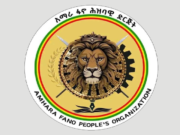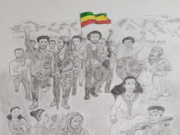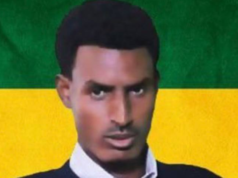Ato Eshete Moges: a lion among men, whose courage blazed like fire across Fano
Girma Berhanu (Professor)
Introduction
I pledge to stand for freedom.
I promise to guard liberty.
I vow to keep independence alive.
No tyranny shall break my resolve.
I have three aims in this paper. The first is to commemorate the fourth anniversary of the untimely passing of Ato Eshete Moges and his son, Ytagessu Eshete—fearless warriors of Fano, whose courage in both life and battle became the very embodiment of heroism. Their strength and honor continue to inspire all who dare to stand against adversity. Their lives, woven into a tapestry of valor and unwavering spirit, echo through time, whispering to future generations of warriors.
In the annals of Fano, Ato Eshete’s name is etched in courage. Through the storms of battle and the trials of life, he stood unbroken—a sentinel of bravery whose legacy will endure beyond the passage of time.
This paper is not an attempt to glorify war, violence, or bloodshed. It is not a tally of casualties, nor does it fall prey to the dangerous notion that war or killing brings harmony, change, or peace. Rather, it is a tribute to a man who sacrificed everything—his family, property, and ultimately his own life—for others. He did so in the spirit of altruism and unparalleled bravery, in defense of his family, his community, and his nation.
I firmly believe that this genuine Fano spirit can serve as a powerful example. It is an ideology rooted not in aggression, but in a deep-seated commitment to justice, sacrifice, and collective liberation—an inspiration for individuals and communities alike to rise against suffering and strive for freedom.
The second aim of this paper is to critically examine and revitalize the ethos of Fano as more than a reactionary force—it is a socio-political consciousness rooted in the principles of self-determination, communal responsibility, and resistance against oppression. In recent times, the term “Fano” has been oversimplified, politicized, and at times mischaracterized. However, at its core, Fano represents an enduring spirit of resilience—a grassroots movement that emerges wherever justice is denied, freedom is threatened, and dignity is trampled.
Through the life and sacrifice of individuals like Ato Eshete Moges and Ytagessu Eshete, we are reminded that Fano is not merely a group or a moment in time; it is a mentality, a moral compass guided by the conviction that silence in the face of injustice is complicity. This paper aims to rekindle that original spirit, to explore how this philosophy can be reclaimed and adapted in contemporary struggles for human rights, local sovereignty, and national unity.
It also seeks to challenge narratives that reduce armed resistance to senseless violence, by situating Fano within a broader historical and philosophical context—one where resistance is seen as a legitimate, even necessary, response to systemic injustice. By doing so, I hope to offer a framework that encourages critical reflection and constructive engagement with the ideals Fano represents, urging future generations to uphold the values of courage, sacrifice, and unwavering commitment to the common good.
The third aim, closely related to the above, is to explore how Ato Eshetu’s final words—spoken during his last telephone conversation—can be brought to life and given enduring meaning. His voice should be transformed into a covenant, a sacred promise or set of guiding principles for new members of Fano to live by, expressed in the form of commandments. As we all remember, his final message embodied profound and all-encompassing love for the Ethiopian nation. It reflected spiritual strength, reverence for God, courage, discipline, altruism, deep paternal love (choosing death rather than abandoning his son’s body—he could have fled and saved himself), unwavering trust in the community, and commitment to the spirit of the Ethiopian state.
The Remarkable Valor of Ato Eshete Moges
The highlands trembled under the shadow of war. Foreign forces advanced with calculated precision, aiming to seize the fertile lands and break the will of a proud people. Villages were burned, trade routes severed, and the cries of the innocent echoed through the valleys. Yet amid the despair, hope rose in the form of a man of humble birth: Ato Eshete Moges.
Eshete, the son of a farmer, was raised among the rolling hills where he learned that a man’s worth is measured not by wealth but by courage, loyalty, and conviction. When news arrived that enemy forces had crossed the northern passes, he could not remain idle. Rallying a band of villagers—blacksmiths, shepherds, and townsfolk untrained in war—he vowed to defend his homeland, no matter the cost.
The heroic story of Eshete Moges and his son, YitagesuMoges, perfectly embodies the indomitable Fano spirit. Their courage and sacrifice are etched into the collective memory of a people who have long fought for their survival and dignity.
No Surrender: A Father and Son’s Last Stand
Ato Eshete Moges was born in the Qewot district near Shewa Robit. A 56-year-old father of seven and a respected businessman, he was also a resident of Shewa Robit—a place he would soon defend with his life.
In late November 2021, as the Tigray People’s Liberation Front (TPLF) forces advanced toward Ataye, near Shewa Robit, Eshete took it upon himself to mobilize local fighters. He made his stand clear:
“If we don’t defend Shewa Robit, who will? I will not leave Shewa Robit and go.”
Initially, he fought from within Shewa Robit. His defiance was so resolute that even his mother had to intervene, as tradition allows, to persuade him to evacuate the city. Eventually, he relocated with his son to a nearby area called Salaysh, just 15 kilometers away. But the TPLF advanced quickly and reached Salaysh as well.
Despite repeated warnings to withdraw, Eshete once again refused. He chose instead to make his final stand—with his son at his side.
When the TPLF reached their residence, Eshete engaged the attackers, killing five soldiers. Yitagesu, armed only with a handgun, shot two more as they attempted to storm the house. In the heat of battle, the young man ran out to retrieve a rifle from a fallen enemy. Together, father and son repositioned to the back of the house, seeking cover in a nearby sorghum field.
Tragically, Yitagesu was shot and killed during this maneuver.
Realizing the gravity of the moment, Eshete called his brother-in-law to deliver what would become his final words:
“Listen to me. Yitagesu has been killed. Can you hear me? Pay attention. He has been killed by the sorghum farm near Assefa Taye’s house. I am near his body. I have been surrounded and I will die here too. Our bodies will lie here… I’ll pay you in heaven.”
Though urged to flee, Eshete refused to abandon his son’s body. Instead, he fought on until his last breath. The exact number of enemy soldiers he killed after the call remains unknown, but records confirm he took down at least two more in the moments that followed.
The transcript of that phone call has since been published, offering Ethiopians of all backgrounds a raw and moving testament of duty, love, and extraordinary sacrifice.
The Spirit of Fano: A Legacy of Resistance
Though unpaid, poorly resourced, and often self-armed, Fano fighters have emerged as a pivotal force in defending the Amhara people from existential threats. Initially fighting against the TPLF, and now facing assaults from federal forces loyal to the Abiy administration, Fano continues its resistance with unwavering resolve.
Through strategic offensives and grassroots support, Fano has defied the odds. They are not feared for their firepower, but for their cause: to protect their people from annihilation. They are the living embodiment of Amhara resilience and defenders of Ethiopia’s unity.
Despite sabotage, state-sponsored suppression, and betrayal by local administrations, Fano has only grown in strength and confidence. What began as a community-based defense force has become a formidable symbol of resistance—an unyielding answer to the oppression and targeted violence against the Amhara people.
And at the heart of this movement lies the story of Eshete and Yitagesu Moges—a father and son who chose honor over safety, sacrifice over surrender. Their legacy will live on, not just in memory, but in the soul of a nation still fighting for justice, survival, and sovereignty.
Despite being an unpaid, under-resourced, and self-armed volunteer defense group, Fano has proven to be a decisive game-changer in the ongoing war that aims to dismantle Ethiopia and exterminate the Amhara population. Through perseverance and courage, Fano has continued its resistance—relentlessly engaging enemy forces until the safety and dignity of the Amhara people are secured, and until both the TPLF and the government army are no longer able to inflict suffering on Ethiopians.
Fano has executed a series of swift and strategic offensives against forces deployed in the Amhara region under the state of emergency. These lightning strikes have demonstrated not only tactical skill but also deep-rooted commitment to defending their people. Fano remains determined to pursue further offensives and secure victory—regardless of whether the threat lies in Addis Ababa, Mekelle, or elsewhere, and no matter how fortified the enemy positions may be. This growing strength and moral clarity have been made possible, in part, by the unparalleled valor of Ato Eshete Moges—a man whose final stand continues to inspire a nation and ignite the spirit of resistance.
Tribute to Ato Eshete Moges: A Legacy of Valor and Resistance
In the long and unyielding history of Ethiopian resistance, few names shine as brightly as that of Ato Eshete Moges. His bravery, self-sacrifice, and unwavering commitment to his people have become a rallying cry for a new generation of freedom fighters. In a time when the very survival of the Amhara people was under threat, he stood firm—not for personal glory, but for duty, dignity, and love of country.
Eshete Moges was not a general, not a politician, nor a soldier trained in the art of war. He was a father, a businessman, a son of the soil—an ordinary man who performed an extraordinary act of courage. Alongside his beloved son, Yitagesu Moges, he chose to face overwhelming odds rather than abandon his homeland or the body of his fallen child. In his final hours, Eshete fought not just with bullets but with a message: that love of country, family, and justice is stronger than fear, and greater than death.
His sacrifice was not in vain. It lit a fire in the hearts of many and became part of the living legacy of Fano—the volunteer defense force that has risen as the last line of protection for the Amhara people. Feared by their enemies not because they seek conquest, but because of their steadfast resolve to defend their people from annihilation, Fano represents the unbroken spirit of a wounded but unbowed nation.
Their rise has unsettled those who wish to see Ethiopia divided and the Amhara people erased. Anti-Ethiopian elements view Fano with fear, not for their weapons, but for their unifying vision and moral clarity. Despite facing betrayal, sabotage, and hostility from the very institutions meant to protect the people, Fano has endured—and grown stronger. They fight on, inspired by the example of heroes like Eshete Moges.
Today, Fano is not just a force of arms, but a force of spirit. And Eshete Moges is not just a martyr, but a symbol—of resistance, of resilience, and of the enduring hope that Ethiopia will rise from the ashes of conflict, forged anew by the sacrifices of its bravest sons and daughters. May the memory of Ato Eshete Moges and his son Yitagesu live on in the hearts of all Ethiopians. Their story is no longer just theirs—it belongs to a nation that refuses to be broken. “If we yield today, tomorrow our children will kneel as slaves. Better to fall with dignity than live in chains.” (Ato Eshete Moges)
Binding Pledge: Covenant in the Annals of Ato Eshete
This section emphasizes the importance of a moral and civic covenant—a solemn pledge rooted in duty, peace, and the defense of community. Framed within the symbolic Annals of Ato Eshete, this is not a call to arms, nor is it an incitement to violence. It is not intended to recruit, endorse, or encourage participation in any armed group or activity.
Rather, it is a general civic pledge—an ethical and symbolic declaration of one’s commitment to resistance, community protection, humanitarian service, and the defense of fundamental human rights within the boundaries of moral responsibility and, where possible, international norms.
The Covenant and Its Purpose
This covenant is envisioned as a binding moral and political oath for those who seek to carry forward the spirit of Ato Eshete Moges—a man who gave his life not in conquest, but in defense of his people, his homeland, and a set of values rooted in honor, sacrifice, and unwavering loyalty to Ethiopia.
Such a pledge would reflect traditional and cultural elements—invoking God, ancestors, and nation—and may serve as a symbolic rite of passage for those who join community-based defense or civic protection initiatives grounded in traditional Fano values.
Core Principles of the Covenant
This symbolic oath would typically affirm:
Ceremonial Reading: Covenant of Promise Before Joining Fano
(This is a symbolic draft meant for ceremonial or commemorative use. It is not an official document or call to action.)
Covenant of Promise in the Name of Ato Eshete Moges
I stand today before God,
my ancestors, and my people,
to make this solemn covenant.
I pledge to defend Ethiopia—
her people, her dignity, and her land.
I will protect the weak,
honor the sacrifices of those who came before me,
and never abandon my duty.
I swear to uphold the secrets of my comrades,
to act with discipline, courage, and unity,
and never betray Fano, my people, or my country.
If the time comes,
I will give my strength,
my voice, and even my life
for the freedom, dignity, and future of Ethiopia—
in the enduring legacy of Ato Eshete Moges.
This is my covenant—
unbroken and unshaken—
until victory or death.
A Civic Pledge to Defend Freedom, Liberty, and Independence
Let it be known: We, who recognize the inherent dignity of all people and the unalienable rights bestowed upon them, do hereby covenant to uphold, protect, and defend the cause of freedom, liberty, and independence. We pledge to resist tyranny and oppression in all its forms—foreign or domestic—and to safeguard the sacred rights of speech, conscience,self-determination, and just governance.
We affirm that liberty is not granted by rulers, but borne within the spirit of every individual;
and that independence is both a right and a responsibility.Therefore, with solemn resolve,
we bind ourselves to vigilance, moral courage, and steadfast unity—so that freedom may endure, liberty may flourish, and independence may never perish.
This symbolic covenant stands not as a tool of violence, but as a moral compass—a spiritual and civic commitment to honor the memory of Ato Eshete Moges, to uphold the dignity of the oppressed, and to remain steadfast in the peaceful defense of justice, community, and national unity. Let it be recited with honor. Let it be remembered with reverence.
Final Words: The Legacy of Ato Eshete Moges
Today, the story of Ato Eshete Moges is told not merely as a tale of battles fought and moments of defiance, but as a testament to what one individual can achieve when bravery, conviction, and love for their people converge. His legacy remains a beacon—a reminder that true heroism is not measured by titles or medals, but by the lives one protects and the hope one inspires.
This is why a covenant in his name is essential—not only to honor the past but to ensure continuity of purpose and commitment for future generations. It must stand as a living pledge for all who take up the Fano cause: to fight not for revenge, but for justice; not for power, but for the protection of their people.
In his compelling article, “If I look at the mass I will never act: Psychic numbing and genocide,” psychologist Paul Slovic (2007) observes that while many people are capable of deep empathy and heroic effort for a single visible victim, that same compassion often fades in the face of mass suffering. When individuals become “one of many,” they risk being ignored—lost in the statistics, drowned out by the scale of the tragedy.
Every genocide is unique, each atrocity bringing its own horrors. But the repetition of mass violence, so often met with silence by the powerful and indifference by the world, points to a deeper, unsettling truth: a fundamental deficiency in our shared humanity. One that must be confronted if it is ever to be overcome.
The Fano fighters, however, do not need to read this in textbooks—they live it. They carry this injustice in their blood and bones. They know all too well that waiting for the world to care is a luxury the Amhara people cannot afford. That is why the strength, the resources, and the unbreakable will to endure must come from within.
We must plant the seeds now—rows of flowers that bloom all year long—to honor the selfless lives of Ato Eshete and his son Yitagesu. Their memory deserves not just silence or whispered prayers, but commemoration, celebration, and eternal remembrance.
Will the bugle play at dusk and dawn as they rest gently on the soil from which they came?
Will there be a day when the flags are raised and the band plays a marching tune in their name?
A day where we gather to honor not only them, but the many Fanos whose names remain unspoken?
Where, I ask, is the sacred place for our unsung heroes?
A father and son now lay in eternal sleep. Neither rich nor famous. Not clad in gold or garlands. But they were giants of the human spirit—resilient, righteous, and ready to give all for the people they loved. Ato Eshete Moges was not just a fighter. He was a symbol. A voice. A man who, through his final act, brought a sense of purpose to a new generation of Fano. He did not live for accolades. But in death, he has earned the deepest reverence a nation can give: the legacy of an honorable life lived fully, and a memory that will never die.
“All too often, when we see injustices, both great and small, we think, that’s terrible, but we do nothing. We say nothing. We let other people fight their own battles. We remain silent because silence is easier. Qui tacet consentire videtur is Latin for ‘Silence gives consent.’ When we say nothing, when we do nothing, we are consenting to these trespasses against us.” ― Roxane Gay, Bad Feminist
Notes
Berhanu, G. (2022). Fano: A living saviour of the Amhara people And the Ethiopian spirit. Advances in Social Sciences Research Journal, 9(1), 112–119. https://doi.org/10.14738/assrj.91.11537https://www.ena.et/web/amh/w/am_179390
Paul Slovic Judgment and Decision Making, Vol. 2, No. 2, April 2007, pp. 79–95
https://youtube.com/watch?v=uwKCTed332Y&si=eUss3gHw70W5qgvK
Fano: A Mass Outrage for Amhara Existence, Justice and Ethiopian Unity https://share.google/166WApR72QNn7zfTb
Gazette Plus https://share.google/ePqSYE9DwKp9sDwAb
Eshete Moges , Yitagesu Eshte valorous father and son paid in life together https://share.google/PUtbTNy7VJp4Bzbxo
The story of Fatherhood in the war field of: Shewarobit– ETHIOPIA – The Voice of Africa https://share.google/PuPVK59lQEIQ7yEqQ
ፋኖን እወዳለሁ፥ ፋኖንስ አልጠላ፣
ተኳሽ እወዳለሁ፥ ተኳሽም አልጠላ፣
ሲደክመኝ አርፋለሁ፥ በጎፈሬው ጥላ።
ፋኖ አገሩ ገባ፥ ሳይሰናበተኝ፣
እሸኘው ነበረ፥ ምንም ቢታክተኝ።



























